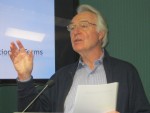Water District Expansion for Byrnwood Debated in North Castle

Concerns from nearby residents regarding usage and possible pollution of the water supply were raised last week as North Castle officials consider Brynwood Golf & Country Club’s request to join a municipal water district.
Brynwood, which received approval for a rezone from the town board in June in hopes of building 73 luxury townhouses and is currently seeking site plan approval from the planning board, has petitioned the town to gain entry into North Castle Water District No. 2.
The district serves Windmill Farm, a development comprised of about 370 properties. Brynwood is asking to be included in the district to serve the 73 residences. Currently, its clubhouse and catering facility use district water.
Resident Linda Sage said she was concerned by potential pollution of the water from pesticides used on Brynwood’s golf course.
Thomas Cusack, a consultant working for the applicant, said the golf course, which opened in 1959, does not use pesticides. Therefore, those are “not applicable to this site,” he said.
Robert Greene, a member of the homeowners group Residents of Windmill, said that Brynwood representatives’ estimates of needing 24 gallons of water per minute during peak periods appear too low. In comparison, Windmill’s peak demand for water is currently 290 gallons per minute for all of the development’s homes, Greene said.
Another resident, Bob Greer, said he was strongly in favor of Brynwood’s proposal. The project would reduce bills for Windmill Farm residents and the district needs another well, which Brynwood would provide, he said.
“It’s kind of a no-brainer,” Greer said. “I’m 100 percent for it.”
If Brynwood becomes part of Water District No. 2 the developer will contribute to the cost of recent capital improvements currently being shouldered by Windmill residents. Brynwood’s buy-in cost should be $318,068 to join the water district, which would offset part of the improvement project’s cost, Greene said.
If the petition is granted, the future Byrnwood residents’ contributions to the district would lower expenses for Windmill homeowners, including for the $10 million water main replacement project. It has been estimated that annual payments for the project would be reduced for the average homeowner by 10 to 20 percent, or $200 to $400 a year.
Brynwood is proposing to develop a new well on water district property and upgrade the current water supply system that would add to the overall pumping capacity of the district. Brynwood’s cost of drilling another well would be $1.2 million, which would pay for the entire project.
The town plans to survey Windmill Farm residents regarding Brynwood’s petition. Some residents said last week the board’s decision should reflect the view of a majority of residents.
Supervisor Michael Schiliro said the board would take the survey results into consideration; however, the results are not binding, Town Attorney Roland Baroni added.
In September, the attorney for Brynwood Partners, Mark Weingarten, said the board’s decision on whether to include his client in the district will not affect whether the project can proceed. If the petition is denied, the applicant will drill one or two wells on its property to supply the proposed 73 residences with water. District water would not be used to irrigate the redesigned golf course, which is part of the project.
Director of Water and Sewer Operations Sal Misitihas said new wells will have to eventually be drilled for Windmill Farm even if the water district is not expanded. He said the town is scheduled to make repairs to Well 5 early next year. Well 1, one of the district’s five wells, is no longer operational, Misiti said.
The new well being proposed by Brynwood would use the new bedrock system, which includes digging underground for between 300 and 400 feet, said Bill Canavan, president of the Somers-based Hydro Environmental Solutions, the town’s hydrology consultant. The bedrock well would last about 50 years, he said.
The town board voted unanimously to adjourn the public hearing to an undetermined date early next year.

